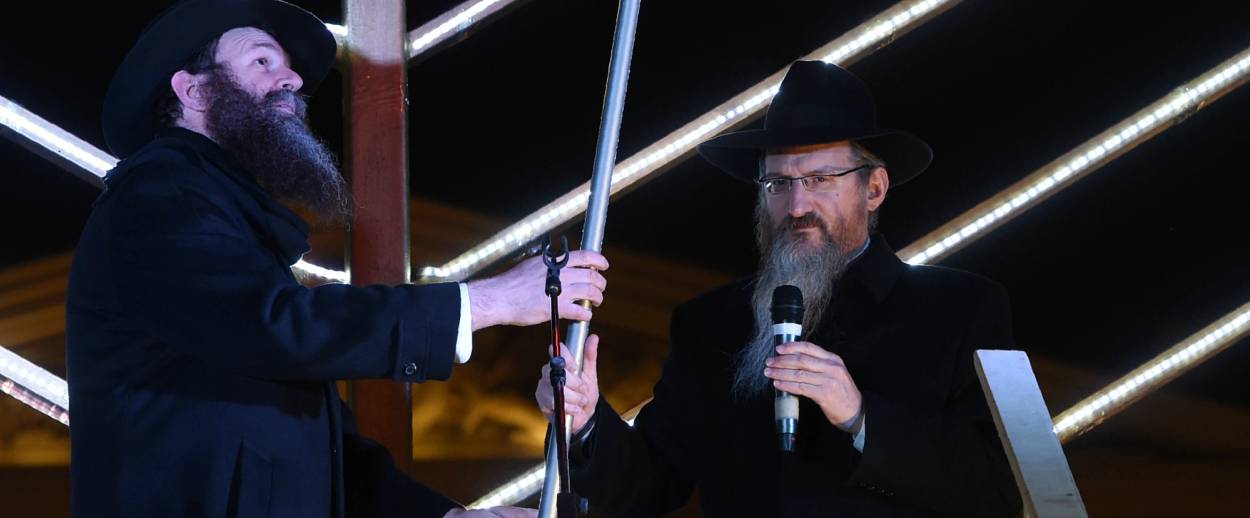Eurostars, the Russian Answer To Birthright, Offers an Intriguing Alternative
Young Russian Jews who commit to regular study can attend European trips they could’ve only dreamed of. Might Birthright be able to learn something?




JTA published a really fantastic piece this week about Eurostars, a program started by the Chabad branch in Russia that subsidizes trips for young Jews to sites of Jewish history all over Europe. Since 2012, Jews aged 18-28 could commit to attending at least “85 percent of a yearlong program studying Torah and Jewish traditions,” at the conclusion of which they’d be rewarded with the trip. Last year, around 1,000 participants took part in the week-long tour, which ended with a cruise from Italy to Monaco, where the participants helped create the largest Jewish community event in the country’s history.
The piece quotes young Jews inspired by their experiences, including one man, Sergei Aryeh Zolotov, who had a belated circumcision when he returned from the trip. More power to you, Sergei.
“I remember a time when the Chabad emissary to France would go around kosher shops to collect nearly expired products to send them” to Russia, Chief Rabbi Berel Lazar told JTA. “Now we are returning to France to extend our support to that community.”
The parallels with Birthright are obvious. Like its more famous cousin, Eurostars seeks to build a sense of identity, and to encourage young Jews to marry Jewish. From the article:
Matchmaking is part of the Eurostars raison d’etre, according to Rabbi Mendy Wilansky, head of the Yahad special programs platform, which is responsible for Eurostars within the Federation of Jewish Communities. The cruise featured popular speed dating evenings, he said.
“In a huge country like Russia with massive assimilation, of course it’s an opportunity for shidduch,” he said.
Eurostars applies this mechanism to Europe, rather than Israel. It is almost entirely a succession of “what was”—stops at Auschwitz and the Hyper Kosher grocery in Paris come to mind—rather than a “what could be.” But I don’t think that is necessarily a bad thing.
Eurostars pulls from the furthest corners of Russia; one of the participants in the article lives closer to Pyongyang than to Moscow. For these socially isolated Jews, it must really be something to see this tabernacle Judaism, this pick-it-up and plop-it-down and pick-it-up-again religion that is woven into the fabric of every city they visit. Yes, it is a history rife with tragedy, but the heights!
Re-connecting with your Jewish heritage has come to mean a certain itinerary in 2018—you go to the Kotel, you hike Masada, you daven in Tzfat—but Jewish life has been out in the world far more often that its been confined to one strip of land. Temple Judaism has been gone for 2,000 years—why not spend some time on what’s happened since?
Beyond that, Eurostars’ ambitious project to retain students who will actually walk away from its program Jewishly literate is an obvious step up over Birthright. Birthrighters are whisked through Israel with the promise of a transformative, unforgettable experience, only to be deposited back in their respective major metropolitan areas the following week with a few words of Hebrew. Not that Birthright is faltering: The program’s mission, at least in part, is to pump the brakes on inter-marriage, and studies show that participants are far more likely than non-participants to marry Jews. And 25 percent of Birthright alumni are married to other Birthright alumni, which is a dazzling statistic.
Still, Eurostars’ educational program provides a template we may want to consider, not only widening the scope of Jewish life, history, and future from Israel to most of the rest of the world but also demanding that actual Jewish learning take place before printing out that boarding pass.
Jesse Bernstein is a former Intern at Tablet.